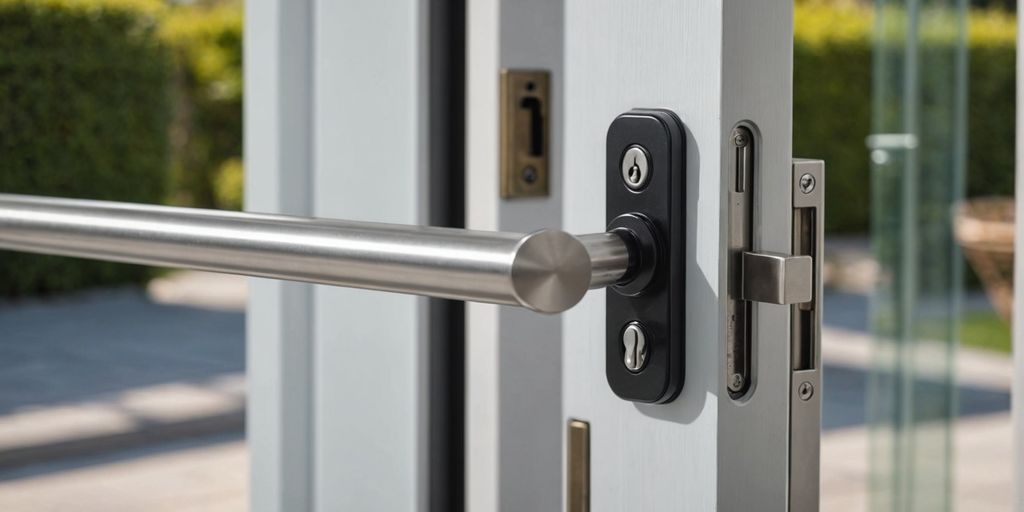
A Comprehensive Guide to Sliding Glass Door Locks
Sliding glass doors are a stylish and practical feature in many homes, offering great views and easy access to outdoor spaces. However, they can also be a weak point in home security if not properly secured. This guide will help you understand the importance of sliding glass door locks, explore the different types available, and provide tips on choosing and installing the right lock for your needs.
Key Takeaways
- Sliding glass doors need strong locks to prevent break-ins and keep your home safe.
- There are various types of sliding door locks, including surface-mounted, mortise, keyed, and bolt locks.
- Choosing the right lock involves assessing your security needs, ensuring compatibility with your door, and considering ease of installation and use.
- Additional security measures like security bars, shatterproof film, and smart locks can further enhance the safety of your sliding glass doors.
- Regular maintenance, including inspection, cleaning, and part replacement, is essential to keep your sliding door locks functioning properly.
Understanding the Importance of Sliding Glass Door Locks
Sliding glass doors are a beautiful addition to any home, offering panoramic views and allowing natural light to flood in. However, they can also be a vulnerable point of entry for intruders if not properly secured. In this guide, we’ll explore the importance of securing sliding glass doors and provide practical tips on how to lock sliding glass doors.
Why Sliding Glass Doors Are Vulnerable
Sliding doors are often considered easier targets for break-ins due to their large glass surfaces and inadequate locking mechanisms. Their sizable glass panels can be quickly shattered, providing intruders with a discreet entry point. Many sliding doors come with basic latch locks that are vulnerable to manipulation, and outdated or poorly maintained hardware can further compromise security. Additionally, even if sliding doors are locked, it's possible to shift or lift a sliding glass door from its track, granting intruders easy access to your home.
The Role of Locks in Home Security
Securing sliding glass doors is crucial for protecting your home and family from potential break-ins. These doors are often targeted by burglars due to their large glass panels and sometimes flimsy locking mechanisms. Without proper security measures in place, the above door can be easily forced open, providing intruders with quick and silent access to your home. A robust lock can act as a strong deterrent, making it much harder for intruders to gain entry.
Common Misconceptions About Sliding Door Locks
There are several misconceptions about sliding door locks that can lead to a false sense of security. One common myth is that all locks are created equal, but in reality, some locks offer much better protection than others. Another misconception is that a locked door is always secure; however, even a locked sliding door can be lifted off its track if not properly secured. It's also a mistake to think that installing a lock is a one-time solution. Regular maintenance and periodic security assessments are essential to ensure that your sliding glass door remains a strong barrier against intruders.
Types of Sliding Glass Door Locks
Surface-Mounted Locks
Surface-mounted locks are installed on the door's surface and frame, making them visible from both sides. They often feature a bolt that extends into the door frame when locked. These locks are easy to install and come in various styles and finishes to match your door's look. Surface-mounted locks are a popular choice for their simplicity and effectiveness.
Mortise Locks
Mortise locks are recessed into the edge of the door, providing a sleeker and more discreet appearance. They typically offer enhanced security compared to surface-mounted locks. Mortise locks are more challenging to install and may require professional assistance, but they provide superior protection against forced entry.
Keyed Locks
Keyed locks require a key to lock and unlock the door from the outside, adding an extra layer of security. These locks come in various configurations, including single-cylinder and double-cylinder options. While keyed locks offer excellent security, they can pose a safety hazard in emergency situations if the key is misplaced or inaccessible.
Bolt Locks
Bolt locks are simple yet effective, consisting of a metal bolt that slides into a corresponding hole in the door frame when engaged. These locks are easy to operate and provide reliable security. Bolt locks are typically installed at the bottom of the door and can be supplemented with additional security measures for added protection.
How to Choose the Right Sliding Glass Door Lock
Assessing Your Security Needs
When selecting a sliding glass door lock, assessing your security needs is crucial. Consider the crime rate in your area and the value of the items inside your home. If you live in a high-crime area, you might need a more robust lock. On the other hand, if your neighborhood is relatively safe, a standard lock might suffice.
Compatibility with Your Door
Not all locks are compatible with every type of sliding glass door. Before purchasing, check the specifications of your door and ensure the lock you choose will fit properly. Some locks are designed for specific door materials, such as aluminum or wood, so make sure to select one that matches your door's construction.
Ease of Installation and Use
The ease of installation and use is another important factor. Some locks can be installed as a DIY project, while others might require professional help. Opt for a lock that you can install and operate without much hassle. A user-friendly lock will encourage consistent use, enhancing your home's security.
Remember, the right lock not only provides security but also peace of mind. Choose wisely to protect your home and loved ones.
Step-by-Step Guide to Installing a Sliding Glass Door Lock
Gathering Necessary Tools
Before you start, make sure you have all the tools you need. This usually includes a drill, screwdriver, tape measure, pencil, and the lock kit. Having everything ready will make the process smoother.
Measuring and Marking
Use a tape measure to find the right spot for the lock on the door and frame. Mark these spots with a pencil. Accurate measurements are crucial to ensure the lock fits perfectly.
Drilling and Installing
Carefully drill holes where you marked earlier. Be cautious to avoid damaging the glass. Once the holes are ready, attach the lock using the screws provided in the lock kit. Follow the manufacturer's instructions closely.
Testing the Lock
After installation, test the lock to make sure it works properly. Lock and unlock the door several times to ensure everything is aligned and functioning smoothly. Make any necessary adjustments.
Installing a sliding glass door lock can greatly enhance your home's security. Taking the time to do it right ensures peace of mind.
Additional Security Measures for Sliding Glass Doors
Security Bars and Rods
Security bars and rods are simple yet effective tools to enhance the safety of your sliding glass doors. These bars fit into the door track or against the door frame, preventing the door from sliding open. Look for bars that can be locked into place for added security. They are easy to install and can withstand considerable force, making it difficult for intruders to push or pry the door open.
Shatterproof Film
Applying shatterproof film to your sliding glass doors can prevent the glass from breaking easily. Even if an intruder manages to shatter the glass, the film holds the broken pieces together, preventing easy entry. Some security films also offer UV protection and can improve your home’s energy efficiency.
Smart Locks and Alarms
Smart locks and alarms provide advanced security for your sliding glass doors. These systems often include door sensors, motion detectors, and cameras that work together to monitor your home. When triggered, they can alert you via smartphone and notify a monitoring service. Many modern systems allow you to arm or disarm remotely, giving you control even when you’re away. This multi-layered approach significantly enhances your home’s security while still allowing you to enjoy the fresh air and open views your sliding doors provide.
Maintenance Tips for Sliding Glass Door Locks
Keeping your sliding glass door locks in good condition is essential for home security. Here are some tips to help you maintain them effectively.
Regular Inspection
Regularly check your locks for signs of wear and tear, such as rust, corrosion, or loose screws. Replace any damaged or worn components promptly to ensure your locks function properly.
Cleaning and Lubrication
Clean your locks and tracks to remove dirt and debris that can affect performance. Use a soft brush or cloth to gently clean the lock mechanism and track. Apply a silicone-based lubricant to the lock mechanism and track to keep them operating smoothly. Avoid using oil-based lubricants as they can attract dirt and debris.
Replacing Worn-Out Parts
Even with regular maintenance, parts of your sliding glass door lock may wear out over time. Look out for signs like difficulty in locking or unlocking, or if the handle feels loose. If you notice any of these issues, it might be time for a new handle or lock.
Regular maintenance can extend the life of your sliding glass door lock and ensure smooth operation for years to come.
Common Issues and Troubleshooting for Sliding Glass Door Locks
Lock Jamming
Lock jamming is a frequent issue with sliding glass door locks. Debris or dirt in the lock mechanism can cause it to jam. To fix this, clean the lock thoroughly and remove any obstructions. Regular maintenance can prevent this problem from occurring.
Misalignment Problems
Misalignment can make it difficult to lock or unlock your sliding glass door. Check the alignment of the lock and the strike plate. If they don't line up, adjust the strike plate or the door itself. Sometimes, the door may need to be lifted slightly to align properly.
Key Issues
Key issues are another common problem. If your key is hard to turn or gets stuck, it might be due to wear and tear. Lubricate the keyhole with graphite powder to make it easier to insert and turn the key. If the problem persists, you may need to replace the lock or consult a professional locksmith.
Regular maintenance and timely adjustments can help keep your sliding glass door lock in optimal condition, ensuring your home remains secure.
Conclusion
Securing your sliding glass doors is a must to keep your home safe. By choosing the right locks and adding extra security measures, you can make it much harder for intruders to get in. Regularly check and maintain your locks to ensure they work properly. With the right steps, you can enjoy the beauty of your sliding glass doors without worrying about safety. Stay vigilant, and your home will be a safer place for you and your family.
Frequently Asked Questions
Can you put a smart lock on a sliding glass door?
Yes, you can add a smart lock to a sliding glass door. Just make sure it fits your door type and follow the instructions from the maker.
What are the options for locking sliding glass doors?
You can use keyed locks, mortise locks, surface-mounted locks, security bars, smart locks, pin locks, foot-operated locks, and more to secure sliding glass doors.
How do burglars open sliding doors?
Burglars might push or pry the door, pick the lock, lift the door off its track, or break the glass to get in.
What should I consider when choosing a sliding glass door lock?
Think about your security needs, if the lock fits your door, and how easy it is to install and use.
Can I install a sliding glass door lock myself?
Yes, many sliding glass door locks are designed for easy DIY installation. Just follow the instructions provided.
How often should I check my sliding glass door lock?
You should inspect your sliding glass door lock regularly for signs of wear and tear, and clean and lubricate it to keep it working well.
